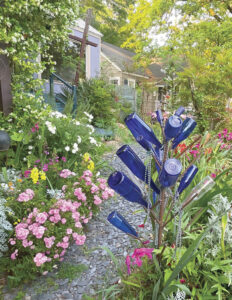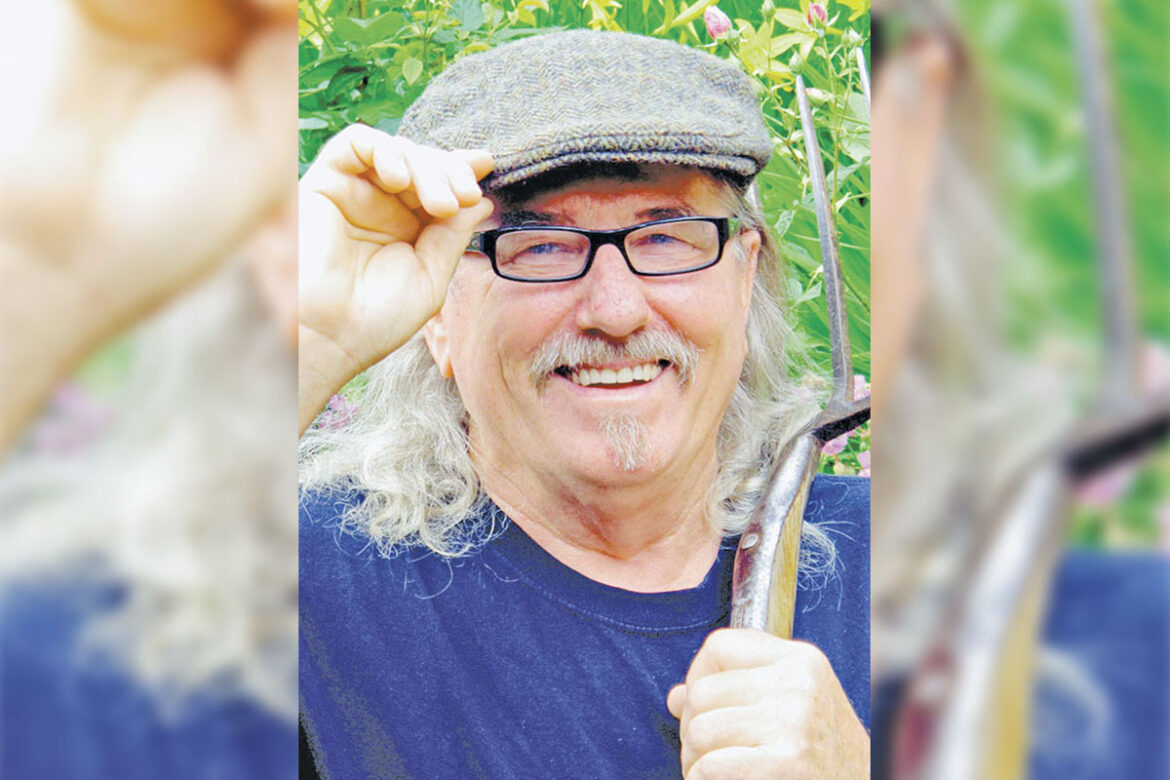 In Felder Rushing’s Jackson garden, a bottle tree shines among vibrant spring flowers, blending art, color and tradition. Photo Courtesy of Felder Rushing
In Felder Rushing’s Jackson garden, a bottle tree shines among vibrant spring flowers, blending art, color and tradition. Photo Courtesy of Felder Rushing
I’ve never been much for horticultural rules, choosing instead to do as I please in my small home garden.
There’s a lot of wiggle room between goal- and efficiency-oriented horticulture and gardening just for the love of it. That said, here are a few ways I apply Ockham’s Razor – the simplest way is the best way – to what I do.
Some are one-shot lessons: never eat wild mushrooms, keep the shovel sharp, protect pollinators and wildlife, and just garden around the fire ants. My favorite two-liner is, “There are only two rules for composting: Stop throwing that stuff away and pile it up somewhere. The rest is finesse.” Oh, and if a plant dies more than once, I plant something else.
My four-stage guidance for dealing with challenges is, in order of importance: “If you can’t fix it, flee it, or fight it, flow with it.” This one takes a good bit of stoic control but reduces anxiety.
But my favorites are generally in threes. When it comes to putting plants in a pot, shrubs in a border or flowers in a vase, I always go with “something roundy, something spikey and something frilly.” It’s a vernacular way of describing the principle of “mass, line and filler” taught in floral design classes.
The three requirements for a plant to become a popular “passalong” (shared by a lot of different gardeners) are that it be worth growing, fuss-free and easy to propagate. Just look around town any season and you’ll see examples of plants widely grown despite not being readily available for sale: orange daylilies, milk-and-wine crinum lilies, paperwhite daffodils, Clara Curtis mums, cannas, the Peggy Martin rose, “cemetery white” iris, red spider lilies and the like.
A few values that make plants popular include unique beauty, extra flavor, long season, being good for pollinators, native, or having historic or family-heirloom status. The more values a plant has, the more different people will want it. Fuss-free means it doesn’t require a lot of maintenance, watering, pest control, constant pruning, protection from weather and the like.
It doesn’t matter how valuable or easy to grow a plant is if it can’t be shared easily. Whether by prolific seed production, rooting cuttings in a glass of water or dividing clumps, this is how so many gardeners share heirlooms worldwide despite them not being offered commercially.
Finally, my garden triad, which I sum up as “plants, process and personality.” A space cannot be a garden without all three.
The first step is choosing appropriate plants. In the wilderness, plants figure out things on their own without human guidance. But in town, we tend to select just the ones we like or want, arranging them unnaturally in one area – a vegetable garden, herb patch or flower bed. That’s the first step toward a garden.
Second, we take care of them – preparing soil, keeping them watered, pruning, weeding and controlling pests – all of which keep the garden from reverting to chaos. Ordinary landscapes, like public parks or plantings around churches and businesses, are kept going this way.
But what separates actual gardens from cookie-cutter landscapes is the personal touch. The easiest way to add that is with garden art, a whole ’nother column, but you get the idea. Gnome or life-size sculpture, bottle tree, urn, whatever. Good gardens hint at the gardener’s personality or worldview. Otherwise, it’s just another pickup truck in the parking lot.
At least, that’s how I see mine. No controlling rules, just relaxing guidelines.
Felder Rushing is a Mississippi author, columnist and host of “The Gestalt Gardener” on MPB Think Radio. Email gardening questions to [email protected].
Posted in Columns
Quality, in-depth journalism is essential to a healthy community. The Dispatch brings you the most complete reporting and insightful commentary in the Golden Triangle, but we need your help to continue our efforts. In the past week, our reporters have posted 42 articles to cdispatch.com. Please consider subscribing to our website for only $2.30 per week to help support local journalism and our community.


Comments are closed.